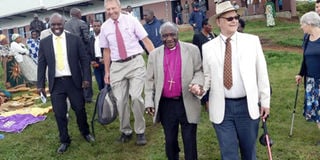Batwa school rehabilitated

Pleased. The chairman of the international friends of the African International Christian Ministry Mr Collin Townsend (Right) and the retired bishop of North Kivu province of the Democratic Republic of Congo (2nd right) together with other guests tour Rwamahano Batwa Primary School after commissioning the newly-constructed classroom block on Friday. PHOTO BY ROBERT MUHEREZA
What you need to know:
- The Batwa have been living as squatters on other people’s land after government evicted them from Bwindi and Mgahinga forests in 1992. There are about 6,200 Batwa living in Uganda, according to the last national cencus. But they have over time complained of marginalisation.
- The chairperson of the International Friends of AICM in the United Kingdom, Mr Collin Townsend, thanked AICM administration for being faithful partners and promised continued support until the Batwa are fully empowered.
RUBANDA. Rwamahano Batwa Primary School found in Muko Sub-county in Rubanda District, has regained its original shape following the reestablishment of infrastructure that was destroyed by wind five years ago.
African International Christian Ministry (AICM), a local NGO operating in Kigezi Sub-region, has constructed a four classroom block, staffroom, head teacher’s office and a four stance ventilated pit latrine at the school.
Part of the school infrastructure was brought down by a hailstorm in 2013, and teachers were conducting lessons under trees.
The school was established on 30-acre land in 2003 by the retired Bishop of North Kivu Province of the Democratic Republic of Congo, the Rt Rev Enock Kayeye, as a centre of education for the Batwa.
The Batwa are a marginalised tribe in Kigezi Sub-region.
They lived in forests but were evicted out of Echuya Forest Reserve, Bwindi and Mgahinga National Parks in the early 1990s.
Most of them are landless, poor and do menial jobs and begging for survival.
Speaking at the ceremony for the opening of the new classroom block in Rwamahano village Ikamiro parish recently, the AICM executive director, Ms Faith Tushabe, said the school started with about 40 Batwa children. It now has 150 pupils from Primary One to Primary Six.
The school receives its funding from AICM and its international friends from the United Kingdom, paying all the teachers’ salaries, and catering for the children’s breakfast and scholastic materials.
Ms Tushabe appealed to government to come to the Batwa’s aid, by especially allocating them land because they depended on handout from NGOs.
She also asked government to provide piped water to the Batwa communities so that they live healthy lives like other Ugandans.
The Rubanda District chairperson, Mr Jogo Kenneth Biryabarema, asked the Batwa to encourage their children to study so that they can ably advocate for their rights.
He also appealed to the Batwa to involve themselves in leadership, especially the local councils.
He also appealed to the non Batwa community members to stop exploiting the group but pay them well for their services.
He added: “I shall liaise with the Rubanda District education department and the district service commission to bring teachers in the school. Other needs such as clean piped water shall be handled.”
Bishop Kayeye, also the founder of AICM, said that he received a vision to serve the marginalised groups in the world in 1958 when he was still a teenager.
With support from international friends in the United Kingdom, Bishop Kayeye has been helping Batwa for the last 35 years.
Ms Kedres Nteziki and Mr Bernard Turyahebwa, both Batwa leaders, thanked AICM and other NGOs such as Bwindi-Mgahinga Conservation Trust for the continued support, including funding education of their children.
They also appealed to the government to resettle them.
The chairperson of the International Friends of AICM in the United Kingdom, Mr Collin Townsend, thanked AICM administration for being faithful partners and promised continued support until the Batwa are fully empowered.




